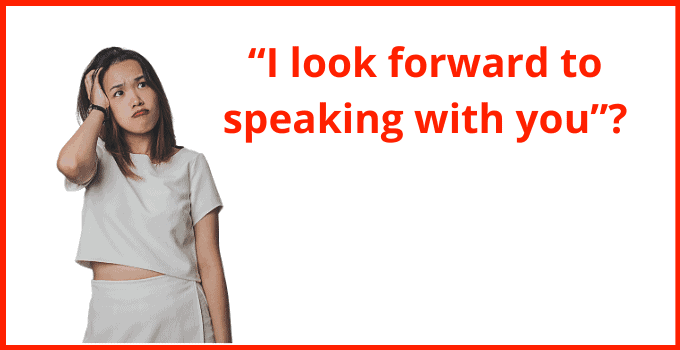Is “I look forward to speaking with you” grammatically correct?
“I look forward to speaking with you” is a phrase commonly used in written communication to indicate that a meeting will take place in the future. However, it may be unclear whether “look” is used correctly in this sentence. Is “I look” or “I am looking” more correct? The answer is that both are technically grammatically correct.
What is the difference between ”I look” vs “I am looking”
Both look and looking are present tense verbs. “I look” is in present simple tense and “I am looking” is in present continuous tense.
Neither tense would be incorrect in this phrase. However, the implications of each tense is slightly different.
Present simple tense is the most basic and common verb tense in the English language.
It is used when describing an action that takes place frequently, when an action is not only taking place right now, and when the phrase is always true.
“I look forward to speaking to you” meets these criteria. You will continue to look forward to the meeting until it takes place and the phrase will continue to be true.
Present continuous tense is used to describe an action that is taking place exactly now or at a specific time in the future.
“I am looking forward to speaking to you” also meets these criteria. The phrase implies that the action of “looking forward to” is taking place at this moment.
While both versions of the phrase are correct, the present simple tense is more formal in tone than the present continuous tense.
How should “I look forward to speaking to you” be used in your writing?
“I look forward to speaking to you” references a future meeting. This meeting could be previously scheduled or you could be requesting a meeting at this time.
This phrase is used in formal written communication addressed to a single person. This includes emails and letters.
More rarely, it can be used when leaving a voicemail when you expect a return phone call.
Usually, the phrase would come at the end of the communication immediately before the salutation and after a description of the topic that you need to discuss with the person being addressed.
As an example:
“[Description of the issue to be discussed].
I look forward to speaking to you.
Thank you, [Your Name]”
What are some alternatives for “I look forward to speaking to you”?
“I look forward to speaking to you” is so commonly used that it may become repetitive in your writing. There are many variations on this phrase that can be used in its place. Consider any of these options.
“I’m eager to discuss this further.”
Why it’s a good choice: Shows enthusiasm for the topic.
I have brainstormed several ideas as to how to streamline the approval process and I’m eager to discuss this further.
“I look forward to hearing your input.”
Why it’s a good choice: Highlights the importance of the individual’s input.
Example:
The annual review process has been an issue for several years and I think a new perspective is just what we need. I look forward to hearing your input.
“I appreciate your taking the time to speak with me.”
Why it’s a good choice: Expresses gratitude for the person’s help.
Example:
I am confident that with your help the project will proceed smoothly. I appreciate your taking the time to speak with me.
“I appreciate your swift response.”
Why it’s a good choice: Indicates that the topic is time sensitive.
Example:
The deadline for the project is next Friday so I appreciate your swift response.

Hey fellow Linguaholics! It’s me, Marcel. I am the proud owner of linguaholic.com. Languages have always been my passion and I have studied Linguistics, Computational Linguistics and Sinology at the University of Zurich. It is my utmost pleasure to share with all of you guys what I know about languages and linguistics in general.

